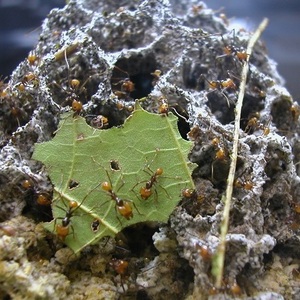Leaf-cutter ants teach researchers about biofuel production




Austin D. Lynch, University of Wisconsin-Madison
June 18, 2013
BY Chris Hanson
Researchers at the University of Wisconsin, Madison are studying enzymes found in leaf-cutter ant colonies that may be used in biofuel production.
Frank Aylward, a bacteriology graduate student and researcher with Great Lakes Bioenergy Research Center said interest in the study stems from ants converting plant biomass into food for energy. “Because leaf-cutter ants are prodigious consumers of plant biomass,” Aylward said, “we hypothesized that the microbes they cultivate in their gardens were a good place to find enzymes that were particularly efficient at degrading plant biomass.” He added they have already identified numerous enzymes in the genome of Leucoagaricus gongylophorus, the fungus inside the colony, that they believe hold promising biotechnological applications.
Advertisement
With support from Aylward’s previous study of fungus gardens and the U.S. DOE’s Joint Genome Institute grant program, researchers are studying how fungus and bacteria work together to process biomass within fungus gardens of insects. “Fungus gardens are a community of microbes,” Aylward said, “although leaf-cutters cultivate one primary fugal symbiont that they consume for food, many groups of bacteria are also present in these environments.”
Aylward added that understanding how whole communities of microbes degrade plant biomass is difficult for numerous technical reasons. “In this study, we are studying fungus gardens in situ, meaning that instead of culturing the microbes and characterizing them separately,” Aylward explained, “we sought to understand how the entire community operates together.”
Advertisement
The overall goal of the study for GLBRC is to access and deconstruct the cellulose for ethanol or advanced biofuel production. By studying how ants and other species break down leaves, researchers may be able to draft new methods of producing biofuels from other feedstocks.
Related Stories
The U.S. Department of Energy Bioenergy Technologies Office (BETO) announced up to $23 million in funding to support research and development (R&D) of domestic chemicals and fuels from biomass and waste resources.
The U.S. DOE has announced its intent to issue funding to support high-impact research and development (R&D) projects in two priority areas: sustainable propane and renewable chemicals and algal system cultivation and preprocessing.
Sens. Sherrod Brown, D-Ohio, and Pete Ricketts, R-Neb., in August introduced the Renewable Chemicals Act, a bill that aims to create a tax credit to support the production of biobased chemicals.
The Chemical Catalysis for Bioenergy Consortium, a consortium of the U.S. DOE’s Bioenergy Technologies Office, has launched an effort that aims to gather community input on the development of new biomass processing facilities.
USDA on March 8 celebrated the second annual National Biobased Products Day, a celebration to raise public awareness of biobased products, their benefits and their contributions to the U.S. economy and rural communities.
Upcoming Events










